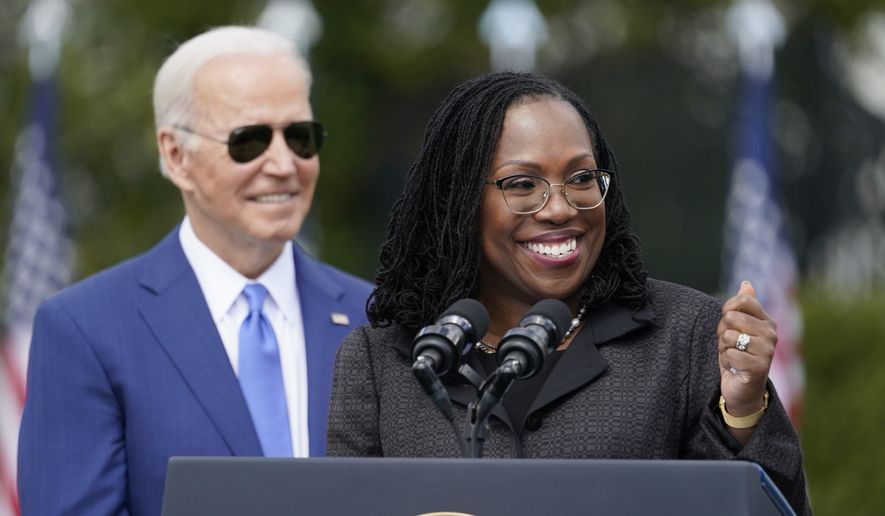Judge Ketanji Brown Jackson took to the podium on the South Lawn of the White House on Friday to thank President Biden for the history-making appointment to be the first Black woman to serve as a Supreme Court justice.
She called it an “extraordinary chance” to serve the country.
“I have dedicated my career to public service because I love this country and the Constitution and the rights that make us free,” she said.
Judge Jackson noted it took more than 230 years for a Black woman to be appointed.
“But we have made it,” she said. “Our children are telling me that they see now more than ever that here in America anything is possible.”
The president hosted the event to celebrate the landmark occasion, saying he knew when he decided to run for president in 2020 that he wanted to appoint a Black woman if a Supreme Court vacancy came available.
“I could see this day,” he said. “The promise of America includes everybody — all of us.”
The judge’s family, senators who supported her and members of the Congressional Black Caucus, as well as other Democratic lawmakers and activists attended the event.
The Senate confirmed Judge Jackson in a 53-47 vote Thursday. Vice President Kamala Harris presided over the vote, while Judge Jackson watched at the White House with the president.
The confirmation gave Mr. Biden a domestic win, fulfilling a 2020 campaign promise to appoint the first Black female justice to the high court.
Judge Jackson breezed through her confirmation hearings, with Republican senators unable to halt her with accusations of being weak on crime, specifically pointing to several cases where she sentenced child porn felons to below the suggested minimum guidelines. Democrats defended her, arguing the sentences were within the mainstream. They said it was up to Congress to update sentencing guidelines.
Judge Jackson graduated from Harvard Law School and previously clerked for retiring Justice Stephen G. Breyer, whom she will be replacing on the bench later this summer when he retires.
She has sat on the U.S. Circuit Court of Appeals for the District of Columbia since June. Before that, she was a district court judge for eight years, where she got noticed by liberal activists with her rulings against former President Donald Trump on everything from executive privilege to immigration.
She ruled against Mr. Trump’s attempt to prevent the release of White House records concerning the Jan. 6, 2021, attack at the U.S. Capitol. She also sided with congressional Democrats in their attempt to get Mr. Trump’s former White House counsel, Don McGahn, to testify in their impeachment inquiries against the former president.
In 2017, Judge Jackson sentenced the “Pizzagate” shooter to four years in prison. The infamous case involved a pizza parlor in Washington where a man from North Carolina opened fire after a false right-wing conspiracy theory was circulated online, claiming the restaurant was at the center of an alleged child-sex abuse ring involving influential Democrats.
She also issued a ruling blocking a Trump administration get-tough deportation policy. That ruling was unanimously overturned by the circuit court, which said she botched the clear language of the law.
Judge Jackson has a wide range of experience as a lawyer, having worked in both private practice and as an assistant federal public defender. She also served on the U.S. Sentencing Commission during the Obama administration.
She will be the sixth woman to sit on the high court, and she’ll join three other women currently on the court: Justices Sonia Sotomayor, Elena Kagan and Amy Coney Barrett, meaning women will hold nearly half of the nine seats.
She will also become just the third Black justice in history and will join Justice Clarence Thomas to mark the first time the court has had two sitting Black justices at one time.
The 53-47 vote for Judge Jackson marks the narrowest margin of victory for any Democratic presidential Supreme Court pick since before the Civil War.
Usually, it has been GOP nominees that have squeaked through, including Mr. Trump’s picks, as Democrats have been more inclined to impose ideological tests on Supreme Court nominees.
Judge Jackson’s narrow vote signals Republicans are now fully engaged in the same practice.
The three Republicans who joined Democrats were Sens. Susan Collins of Maine, Lisa Murkowski of Alaska and Mitt Romney of Utah.
Judge Jackson’s victory was only possible because the threshold for clearing a Senate filibuster for judicial nominations was reduced over the last decade. Now, it only takes a majority vote, rather than the 60 vote threshold.
Judge Jackson’s path to confirmation was relatively painless, particularly when compared to the nastiness of the process for Mr. Trump’s three nominees.
• Stephen Dinan contributed to this story.
• Alex Swoyer can be reached at aswoyer@washingtontimes.com.




Please read our comment policy before commenting.